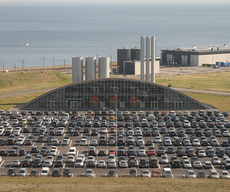
A landmark free trade agreement (FTA) between the EU and South Korea moved a step closer to final completion on Wednesday (23 June), with MEPs laying out their terms for an accompanying safeguard clause that is designed to protect vulnerable industries.
Parliament and member states have co-decision powers regarding legislation for the safeguard clause, a mechanism that is likely to play a pivotal role in winning over wavering deputies to the merits of the overall deal.
European small car manufacturers continue to oppose the agreement, initialed between South Korea and the European Commission last October, on the grounds that a system of 'duty drawbacks' will give South Korean manufacturers an unfair advantage.
The controversial system would enable automobile producers in the Asian country to claim a refund on EU import duties paid on car components purchased outside South Korea.
In approving a report by centre-right MEP Pablo Zalba Bidegain on the safeguard clause on Wednesday, members of parliament's trade committee indicated they want components of the precautionary safeguard mechanism to be stepped up.
The EU should be able to suspend the drawbacks when they lead to an excessive increase in imports from South Korea that threaten "serious injury" to European producers, says the document.
MEPs also decided that, besides the commission and national governments, the European Parliament, the EU-Korean Domestic Advisory Group, and other associations representing at least 25 percent of their industry should be entitled to initiate an investigation into the need for safeguard measures.
"I am a firm defender of balanced free trade and I think this regulation is pushing in this direction, making the FTA more attractive for those industrial sectors most concerned by its possible negative effects", Mr Zalba said after the vote.
The new demands could prove a decisive factor in winning over MEPs from small car-producing nations such as Italy, with deputies currently subject to intense lobbying before they are expected to give their final consent to the overall deal this November.
Pros and Cons
The diverging views held by different industrial sectors were on full display in a public hearing held in the parliament's trade committee before the vote, a situation nicely summed up by left-wing MEP Joe Higgins.
"We usually have a conflict in this committee between capital and labour, but today its businesses who are at each other throats," said the Irish deputy.
Ivan Hodac, secretary general of the European Automobile Manufacturers' Association, said the car industry was being used as a mere "bargaining chip" in the negotiations with South Korea and asked for the duty reduction mechanism to be withdrawn after five years.
"We firmly believe that the duty drawback system, that has never been given to anyone else, is creating unfair competition," Mr Hodac told deputies, adding that 30,000 jobs would be lost in the EU's car industry under the deal as it currently stands.
But Dr Stephen Woolcock, a lecturer in international political economy at the London School of Economics, said this figure did not take account of the number of jobs that would be created in the EU as a result of direct investment from South Korean firms.
Representatives from the European services sector were also quick to indicate their complete support for the FTA.
Mr Pascal Kerneis, managing director of the European Services Forum, said rejection of the deal would set a dangerous precedent, mimicking the current situation in the US where an initialed agreement has been left to languish in congress.
"The services sector is much more important for EU jobs that the car sector," he told this website. "That's just a fact."
Wrangling over the FTA, which took two and a half years to negotiate, and the supplementary safeguard clause, is likely to continue right up to their final approval.
The commission estimates the agreement will open up new trade opportunities in goods and services worth €19.1 billion for the EU and €12.8 billion for South Korea.

No hay comentarios:
Publicar un comentario